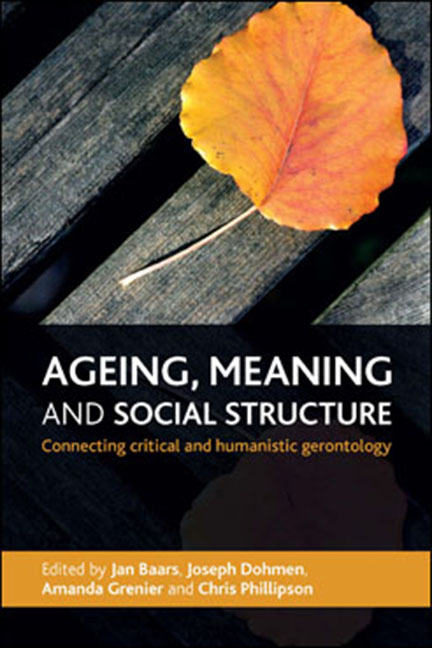Book contents
- Frontmatter
- Contents
- Notes on contributors
- Acknowledgements
- one Introduction
- two Connecting meaning with social structure: theoretical foundations
- three My own life: ethics, ageing and lifestyle
- four Rethinking agency in late life: structural and interpretive approaches
- five Dementia: beyond structures of medicalisation and cultural neglect
- six Self-realisation and ageing: a spiritual perspective
- seven Social ability or social frailty? The balance between autonomy and connectedness in the lives of older people
- eight Critical perspectives on social work with older people
- nine Community-based participatory action research: opportunities and challenges for critical gerontology
- ten Commentary: contingent ageing, naturalisation and some rays of intellectual hope
- Index
two - Connecting meaning with social structure: theoretical foundations
Published online by Cambridge University Press: 07 September 2022
- Frontmatter
- Contents
- Notes on contributors
- Acknowledgements
- one Introduction
- two Connecting meaning with social structure: theoretical foundations
- three My own life: ethics, ageing and lifestyle
- four Rethinking agency in late life: structural and interpretive approaches
- five Dementia: beyond structures of medicalisation and cultural neglect
- six Self-realisation and ageing: a spiritual perspective
- seven Social ability or social frailty? The balance between autonomy and connectedness in the lives of older people
- eight Critical perspectives on social work with older people
- nine Community-based participatory action research: opportunities and challenges for critical gerontology
- ten Commentary: contingent ageing, naturalisation and some rays of intellectual hope
- Index
Summary
Life's but a walking shadow, a poor player,
That struts and frets his hour upon the stage,
And then is heard no more. It is a tale
Told by an idiot, full of sound and fury,
Signifying nothing. (Shakespeare, ‘Macbeth’)
Introduction
Although these words remind us of the vulnerability of human life and its meanings, we rarely live according to such aloof attempts at wisdom but instead try to find, support and change meaningful orientations that may help us through our lives. Within the broad context of basic narratives, experiences are interpreted in such a way that at least some basic orientation results that helps in facing situations that are seen as important for our lives. Meaningful orientations prevent the world in which somebody lives from being experienced as a chaotically unconnected succession of impressions.
Connections play a fundamental role in the constitution of meaning. If we say that a sentence is meaningless, we usually intend to say that it is not connected, neither in itself, nor can we connect to it. And because we inevitably encounter other people and develop forms of intimacy, friendship, cooperation or conflict, meaningful orientations will include moral dimensions besides those that are cognitive. Seeing connections and experiencing connectednes with other people, with specific regions, cultures, nations or even the world, is constitutive for the experience that our lives have meaning. However, during long lives connections may become unclear or problematic, and experiences of connectedness with ‘normal’ adults may come under pressure because of ageist practices.
A fundamental point of departure should be the recognition that ageing people are adults and citizens like others, and that ‘normality’ is an elusive concept that invariably serves specific interests. This does not mean, however, that ageing is not an important process with significant consequences for individuals and societies or cultures. But the age-related demarcations (50+, 55+ or 65+) that are constructed in society to distinguish ‘the aged’ from other, seemingly ‘ageless’ adults, are quite arbitrary in light of the impressive differences within both categories of ‘normal’ versus ‘ageing’ or ‘aged’ adults (Baars, 2010c, 2012).
Unfortunately, however, ageing people are too often set apart and treated differently from other adults. Often such practices form part of what Binstock (1983, 2010) terms ‘compassionate ageism’, a mixture of protection and exclusion.
- Type
- Chapter
- Information
- Ageing, Meaning and Social StructureConnecting Critical and Humanistic Gerontology, pp. 11 - 30Publisher: Bristol University PressPrint publication year: 2013
- 2
- Cited by



